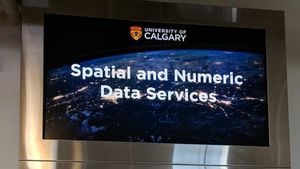I have been involved in a couple of conversations recently about cyberinfrastructure and e-research, and more particularly about how research libraries can create value for science faculty on their campuses. ‘If we don’t create more value for the bio-sciences, then we’re toast’ was one memorable remark I heard …
The computational and data focus of much science activity presents a new set of issues to work through. The presentations of Jim Gray of Microsoft provide an accessible overview of how science is changing. (See [ppt] and [ppt] for example.) See also Where the Rubber Meets the Sky: Bridging the Gap between Databases and Science , a recent discussion of e-science issues flowing from Gray’s longstanding collaboration with colleagues at JHU and their work with astronomical data. Alex Szalay of JHU is a co-author of all of the above.
There has been some discussion of e-science and libraries by David Messerschmitt (in the context of the widely disseminated NSF cyberinfrastructure report), and the views of Tony Hey, who runs a large UK e-research initiative, were reported in the library press last year. In each case, there is a view that there are opportunities for libraries to do more to support this new way of working. In the UK also, JISC has a major investment in support for e-research, and looking through its initiatives in that area gives some sense of issues.
I was prompted to do this entry because I came across the web page for the Research Support Service at Manchester Computing:
The role of RSS is to provide the support for specialist IT requirements, and in particular, the e-Research requirements of the University. [The University of Manchester]
They discuss e-research as follows:
e-Research is simply the use of IT technologies to support research, but it focuses on three critical aspects – data, resources and collaboration
Data – collect (experiment or simulation), store, manage, explore, mine and present
Scientists need to be able to combine primary data and new models from many sources and to utilise more effective tools to analyze, visualize and simulate increasingly complex interrelations. The ability to access so much primary, derived and diverse data will lead to a qualitative change in the way research is done.
Aggregating distributed resources, including both IT and experimental facilities
The computing infrastructure must evolve and develop so that Manchester researchers are able firstly to recognise the changing role of computing within the research process and to capitalise upon the infrastructure developments at the earliest opportunity.
Global and interdisciplinary collaboration
One increasingly significant change in research is the greater interdisciplinary co-operation and the need for research to be concentrated in large groupings. The boundaries between disciplines areas are increasingly fuzzy, with much research being carried out at the boundaries of subjects rather than at the core.[The University of Manchester]
This group was formerly known as Supercomputing, visualization and e-science and its legacy web pages give an interesting overview of the type of support provided for e-research by the largest academic computing unit in Europe.
Over the next few years, a major question for research libraries will be what support they provide in this environment, and that conversation is only beginning. For some pointers about potential direction, see the interesting eBank UK project.
A related post: Where the money is going.



